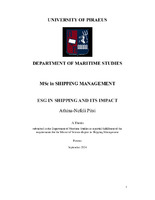| dc.contributor.advisor | Polemis, Dionisios | |
| dc.contributor.advisor | Πολέμης, Διονύσιος | |
| dc.contributor.author | Pitsi, Athina - Nefeli | |
| dc.contributor.author | Πιτσή, Αθηνά - Νεφέλη | |
| dc.date.accessioned | 2024-10-11T06:08:43Z | |
| dc.date.available | 2024-10-11T06:08:43Z | |
| dc.date.issued | 2024-09 | |
| dc.identifier.uri | https://dione.lib.unipi.gr/xmlui/handle/unipi/16835 | |
| dc.identifier.uri | http://dx.doi.org/10.26267/unipi_dione/4257 | |
| dc.description.abstract | Στον σύγχρονο κόσμο, οι επιχειρήσεις απαιτείται να κάνουν αλλαγές με σκοπό να ικανοποιήσουν την συνεχώς αυξανόμενη ανάγκη για βιώσιμη ανάπτυξη, η οποία βασίζεται στην ESG (environmental, social, and governance) στρατηγική. Κατά την διάρκεια των τελευταίων δεκαετιών, έχει δοθεί σημαντική προσοχή στην έννοια της βιώσιμης ανάπτυξης κατά τον σχεδιασμό στρατηγικής. Ωστόσο, δεν έχουν οριστεί κριτήρια, δείκτες ή πλαίσια ανάπτυξης για αυτή την έννοια. Ως συνέπεια αυτού, η αφομοίωση της σε πραγματικές πρακτικές ήταν ανεπαρκής. Το πλαίσιο ESG, το οποίο αξιολογεί πόσο καλά αποδίδει μια εταιρεία σε διάφορες κατηγορίες και τομείς, αποτελεί παράγοντα αυτής της διαδικασίας. Ο στόχος αυτής της διπλωματικής είναι να παράσχει στοιχεία που αποδεικνύουν γιατί η ναυτιλιακή βιομηχανία πρέπει να υιοθετήσει ESG πρότυπα και πρακτικές και γιατί αυτό είναι επωφελές. Αρχικά, θα παρουσιάσουμε την έννοια της βιώσιμης ανάπτυξης, καθώς και τις έννοιες της περιβαλλοντικής, κοινωνικής και κυβερνητικής βιωσιμότητας. Στην συνέχεια, θα παρουσιάσουμε εν συντομία τους παράγοντες και τις εξελίξεις στον βιομηχανικό τομέα, οι οποίοι είναι υπεύθυνοι για την διαμόρφωση αυτών των αντιλήψεων. Επόμενο στάδιο αποτελεί η εξέταση των διαδικασιών ανάπτυξης περιβαλλοντικής, κοινωνικής και κυβερνητικής (ESG) πολιτικής, καθώς και των κύριων προσεγγίσεων που ακολουθούν οι ναυτιλιακές εταιρείες και των μετρήσεων που χρησιμοποιούνται για την αξιολόγηση του επιπέδου επιτυχίας τους. Εν κατακλείδι, θα ερευνήσουμε εάν η περιβαλλοντική, κοινωνική και κυβερνητική πολιτική συνδέεται με την απόκτηση ανταγωνιστικού πλεονεκτήματος, όπως επίσης και πιθανά οφέλη και προκλήσεις που συνδέονται με την εφαρμογή τους στον κλάδο της ναυτιλίας. | el |
| dc.format.extent | 61 | el |
| dc.language.iso | en | el |
| dc.publisher | Πανεπιστήμιο Πειραιώς | el |
| dc.title | ESG in shipping and its impact | el |
| dc.type | Master Thesis | el |
| dc.contributor.department | Σχολή Ναυτιλίας και Βιομηχανίας. Τμήμα Ναυτιλιακών Σπουδών | el |
| dc.description.abstractEN | In the modern world, firms are required to make adjustments in order to fulfill the ever-increasing need for sustainable development that is based on an ESG (environmental, social, and governance) strategy. The concept of sustainable development has been given a significant amount of attention in policy planning over the last several decades; yet, there have been no defined criteria, indicators, or development frameworks for this concept. As a consequence of this, the assimilation of it into real practices has been quite insufficient. The ESG framework, which evaluates how well a company performs in a number of different categories, is the product of this process. The objective of this piece is to provide evidence that demonstrates why the shipping industry should adopt ESG standards and why doing so is beneficial. To begin, we will provide a definition of sustainable development as well as the concepts of environmental, social, and governance sustainability. After that, we will briefly discuss the factors and developments in the industrial sector that were responsible for shaping these conceptions. Examining the process of developing an environmental, social, and governance (ESG) policy, as well as the primary approaches that shipping companies use and the metrics that are utilized to assess their level of success, is the next stage. Finally, we will investigate whether or not environmental, social, and governance (ESG) is associated with acquiring a competitive advantage, as well as the possible benefits and challenges associated with applying it in the shipping industry. | el |
| dc.contributor.master | Shipping Management | el |
| dc.subject.keyword | ESG | el |
| dc.subject.keyword | Shipping policy | el |
| dc.subject.keyword | Environmental concerns | el |
| dc.subject.keyword | Social concerns | el |
| dc.subject.keyword | Governance (ESG) concerns | el |
| dc.subject.keyword | Incentives | el |
| dc.subject.keyword | Strategy | el |
| dc.subject.keyword | ESG decision-making | el |
| dc.subject.keyword | Decarbonization activities | el |
| dc.subject.keyword | SEEMP | el |
| dc.subject.keyword | Social measurements | el |
| dc.subject.keyword | European Taxonomy | el |
| dc.date.defense | 2024-09 | |


